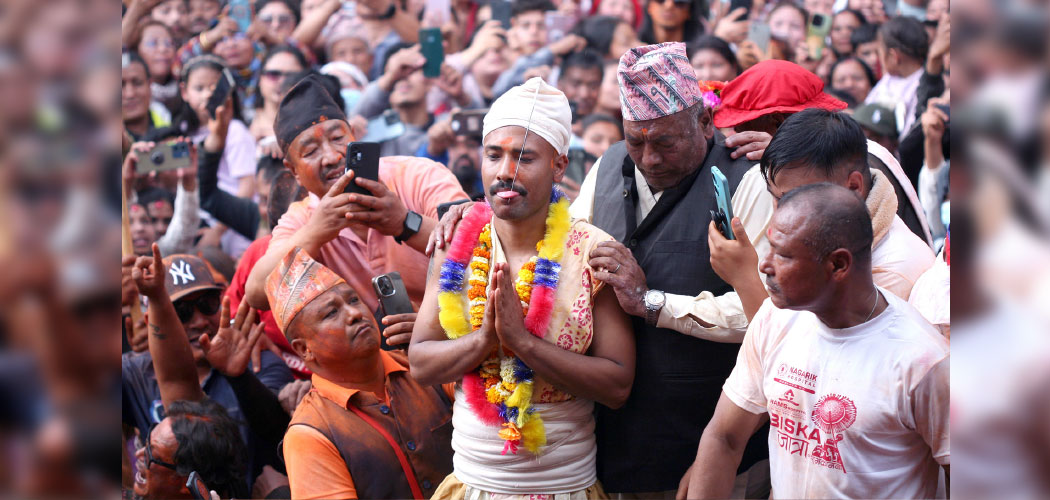
SATV 16 April, Kathmandu: Sujan Bagh Shrestha, 30, a resident of Khasi, Bode in Madhyapur Thimi Municipality, pierced his tongue for the third time on Tuesday during the annual Jibro Chhedne (Tongue Piercing) festival. Shrestha performed this sacred ritual in an endeavour to preserve the centuries-old tradition that is gradually fading away.
Bode, a historic Newar settlement in Madhyapur Thimi, Bhaktapur, is renowned for its ancient tongue-piercing festival, celebrated every year on the second day of the Nepali New Year.
Sujan chose to continue the tradition after his father, Buddha Krishna, stepped away. Buddha Krishna had his tongue pierced nine times between 2005 and 2022. This year, Sujan’s tongue was pierced by his uncle, Krishna Chandra Bagh Shrestha, elder brother of Buddha Krishna, who himself has undergone the ritual 12 times.
On the day of the event, Naike (ritual leader) Krishna Chandra performed special worship of various local deities before the ceremony began. The tongue-piercing ceremony was held on the premises of the Ganesh Temple.
Traditional Newari music, known as Nathakhi, was played during the ceremony, enhancing its spiritual and cultural ambiance.
After Sujan’s tongue was pierced with a 10-inch-long, three-pronged iron needle, he walked through different neighbourhoods of Bode for two to three hours, carrying a half-moon-shaped Mahadeep (sacred torch) made from 13 sticks of Nigalo (a type of Himalayan bamboo).
After completing the ritual circumambulation of Bode, the needle was removed at the Mahalaxmi Temple, and the hole in Sujan’s tongue was filled with sacred mud from the temple premises. The needle was then placed at the door of the Ganesh Temple, located to the right of the Nrityanath Temple.
To prepare for the ritual, Sujan had observed fast for three days, drinking only water. The fast ended after the successful completion of the tongue-piercing ceremony.
It is believed that if the prescribed customs and rituals are not followed properly, there could be bleeding or other misfortunes during the act.
According to legend, ghosts, ghouls, and skeletons once inhabited the area around Neelbarahi in Bode and caused great suffering to the local people. Upon learning of this, a tantric named Bhimadatta Karmacharya devised a plan to trap the spirits.
He instructed the townspeople not to work in the fields for a month. When the spirits looked out from Neelbarahi’s courtyard and saw the fields empty, they attempted to enter the town. A vampire (khayak) that tried to sneak in through Bode’s western gate was caught in Bhimadatta’s trap.
As punishment, the vampire was made to carry a heavy load of wood. Unable to bear the pain, he begged for mercy and promised to never harm the people of Bode again. He also vowed to return every year for seven years to have his tongue pierced in atonement.
However, after Neelbarahi appeared in Bhimadatta’s dream and expressed anger over the mistreatment of his doorman, Bhimadatta sought forgiveness through a ritual before continuing the tongue-piercing ceremony — a practice still observed today.
According to belief, the vampire’s tongue was pierced seven times, after which he vanished. It is believed that Bhimadatta Karmacharya established this tradition of tongue piercing among the people of Bode.
Historical records show that 13 individuals have performed the ritual in the festival’s 111-year-old history. A large crowd gathers each year to witness this fascinating and deeply spiritual event. The festival is believed to have been initiated by King Jagajyoti Malla and remains a revered part of the Newari culture.








